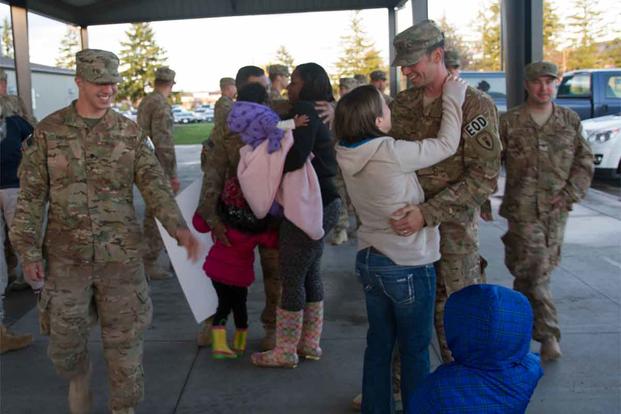Acknowledging that the Army has a shortage of mental health providers, service leaders are telling families they should also consider other available Army services and forge personal connections to cope with the stressors of military life.
During a Tuesday forum at the Association of the U.S. Army's annual meeting in Washington, D.C., mental health topped the subjects of concern for the soldiers and family members in the standing-room-only ballroom.
Army Secretary Christine Wormuth, Army Chief of Staff Gen. James McConville and Sergeant Major of the Army Michael Grinston encouraged those who need help to seek it, but that soldiers and families had options if they didn't necessarily need medical intervention.
Read Next: How Trauma Before Service is Shaping a Generation of Troops
Wormuth said she has seen counselors or therapists during different period of her life, and Grinston, who has often said he has sought therapy, said he recently got help after a "tough summer for the Grinstons."
After a questioner asked about efforts to reduce the stigma of mental health treatment, Grinston said it was "100% OK to seek behavioral health," noting that he still has his security clearance and goes to all top-level meetings.
"Taking advantage of behavioral health resources, that is actually a sign of strength, not a vulnerability," said Wormuth. "It's helping yourself solve a problem, and there's nothing to be ashamed about when it comes to doing that."
Army leaders have promoted behavioral health treatment for roughly a decade, attempting to eliminate the stigma of psychiatric help amid two intense wars that have left soldiers and families scarred psychologically.
Mental wellness amid troops again rose to the forefront this year after a spate of suicides in Alaska in 2021 left as many as 17 dead. Some research indicates that roughly 14% to 15% of U.S. troops who deployed to Afghanistan or Iraq have a mental health condition, such as post-traumatic stress disorder or depression.
According to the Armed Forces Health Surveillance Division, 456,293 active-duty service members were diagnosed with at least one mental health disorder from 2016 to 2020, while an additional 84,815 had mental health issues associated with family, lifestyle issues, mistreatment or substance abuse. During the forum, McConville urged soldiers and family members to seek care for mental health issues, just as they would for any other medical issue.
"People don't commit heart disease; they die of heart disease. People don't commit suicide; they die of suicide," McConville said, paraphrasing a comment made to him by a Gold Star mother. "Just like heart disease, if you treat [mental health conditions] early on, when things are just starting to develop. I think we can save a lot more lives."
The officials said the service is working to increase the number of behavioral health providers available to personnel, to include using military personnel to fill mental health jobs usually staffed by civilians.
But, the leaders noted, the service has many other resources that soldiers and families can access beyond their medical care to maintain mental wellness.
Grinston pointed to facilities such as the Army Wellness Center at Fort Belvoir, Virginia, which hosts stress management classes and promotes mindfulness.
"It's one of my favorite places to go ... meditation, they've got this really great chair. They guard the door for 10 minutes -- gives the sergeant major of the Army a chance for some meditation in the massage chair," Grinston said.
Other resources include chaplains, Military and Family Life counselors, school counselors, family, friends and fellow service members, the leaders added.
"The more connections you have, the better, so we can't just say, 'Oh, just go to behavioral health,' but if you have no friends, you have no family, I think you're still at the risk for a lot of things," Grinston said.
"Some of those resources are your family, your friends, your golf buddies, your running partners, the chief of staff of the Army, right? That's your squad," Grinston said, smiling at McConville.
Other topics addressed during the town hall meeting included the impact of inflation on Army families, spouse employment, a new enrollment system for the Exceptional Family Member Program – the military’s program to manage the care of family members with special needs – and health care.
One audience member raised concerns that military health care reforms would decrease access to medical care, given that the service plans to cut thousands of medical billets as part of the overhaul.
Surgeon General of the Army Lt. Gen. Scott Dingle said he balked at an original plan to cut 6,900 jobs and, after a reassessment, has targeted 2,900 jobs for elimination, primarily at Army Medical Command instead of military treatment facility positions.
The plan must be approved by Congress before it proceeds, he said.
"There have been no cuts as of yet, but when the cuts do come, if they come, there will be no impact on services," Dingle said.
"We will make sure that our soldiers, our families and our soldiers for life are getting the health care they deserve," added McConville. "So if you are in an area where you have been put in civilian care and you're not getting the health care you need, we need to know that ... If you don't let us know, we won't know."
-- Patricia Kime can be reached at Patricia.Kime@Military.com. Follow her on Twitter @patriciakime.
Related: Commanding Officers Must Help Troops Get Mental Health Care Under New Legislation












